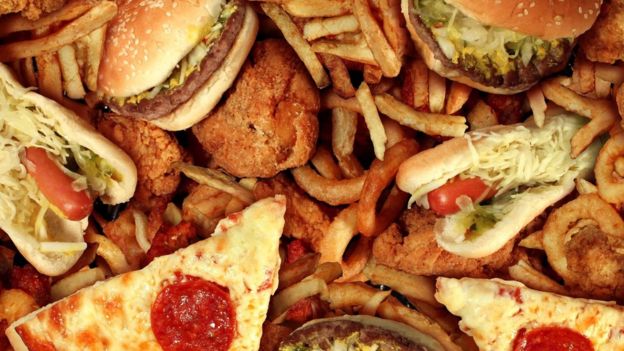
The government must do more to reduce the number of cut-price and multi-buy offers on unhealthy food to help curb childhood obesity, a group of MPs say.
The report, by the Health Select Committee, also calls for rules on junk food advertisements to be made tougher.
It argues the government’s official obesity plan contains “vague statements” that are “inadequate”.
But ministers say the strategy is the world’s “most ambitious plan on childhood obesity”.
The main features of the government’s long-awaited childhood obesity plan, published in October 2016, were a sugar levy and a voluntary target to cut sugar in children’s food and drink by 20% by 2020.
But health organisations and campaigners were almost universally of the view that there should have been wider action.
In the latest Health Select Committee report, MPs made further calls for curbs on big discounts and price promotions on unhealthy food, citing evidence from the food industry that responsible retailers were being disadvantaged by those who continued to offer discounts on food high in sugar and fat.
‘Price war on vegetables’
The report states the committee is “extremely disappointed” the government has not regulated discounting and price promotions to offer retailers a “level playing field”.
But the committee welcomed moves by retailers “such as Aldi and Lidl” that have reduced the number of multi-buy deals and focused on a single price, in order to reduce consumption.
Public Health England has announced it will start monitoring the effect price promotions have on people’s sugar intake.
Figures from the British Retail Consortium (BRC) suggest that the amount of food and drink bought on promotion in the UK has reduced from 40% to 26%.
Director of food and sustainability Andrew Opie said: “Evidence shows that more retailers are moving towards low prices, these multi-buys are already diminishing because that’s what consumers want.
“They want surety [of low prices] at point of purchase.”
The consortium’s representative Andrea Martinez-Inchausti said retailers had internal policies to promote healthier products, and last Christmas was “one of the first times when there was a real price war over carrots” and other healthier products.
But she said there would have to be industry-wide agreement if junk food promotions were to be reduced.
The MPs also suggested a range of measures to regulate junk food adverts seen by children on TV, such as extending current restrictions to apply across all programmes that children are likely to watch rather than to just programming specifically aimed at children.
They also recommended the levy on sugary drinks should be extended to milk-based drinks that have added sugar.
Committee chairman Dr Sarah Wollaston said: “We are extremely disappointed that the government has rejected a number of our recommendations.
“These omissions mean that the current plan misses important opportunities to tackle childhood obesity.
“Vague statements about seeing how the current plan turns out are inadequate to the seriousness and urgency of this major public health challenge.”
‘Major challenge’
But responding to the report, public health minister Nicola Blackwood said: “We welcome the committee’s recognition of the progress we have made in this area, delivering the most ambitious plan on childhood obesity in the world.
“It is backed by the soft drinks industry levy as well as the most comprehensive reformulation programme of its kind, anywhere.”
She added: “Voluntary approaches have been shown to be very effective, but as we have repeatedly said, we have not ruled out further measures if results are not seen.”
 Image copyrightWILDPIXEL
Image copyrightWILDPIXELMeanwhile, Tim Rycroft, of the Food and Drink Federation, said: “The government has challenged the entire food industry to help people get fewer calories from sugars by adapting recipes, lowering portions and encouraging people to switch to low sugar options…
“This ambitious programme, and the work on calories to follow, present a major challenge for industry.
“Manufacturers, for their part, are up for this challenge.”
He added: “We are pleased that the committee recognises the landmark move made by companies in supporting changes which stop adverting of products high in fat, sugar and salt in media aimed at under-16s.
“The most recent Ofcom review found current restrictions on TV advertising, comprehensively adhered to and enforced, to be appropriate and sufficient.”
[“Source-bbc”]




